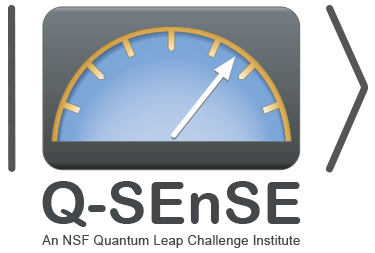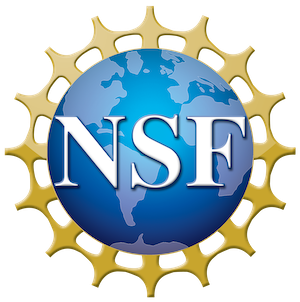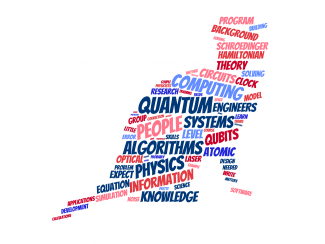Technologies such as quantum computing, networking, and sensing are moving out of the laboratory to applications in the wider world. These technologies are being developed and disseminated by a broad range of companies that make up the Quantum Industry (see, for example, the Quantum Economic Development Consortium). In light of this general excitement around quantum technologies, we are interested in learning how best higher-education institutions can adapt their existing curricula and degree programs to meet the needs of this new industry.
Ongoing work
Educators & Industry Perspectives on the Quantum Workforce
We are working on an NSF project titled “Education landscape for quantum information science & engineering: Guiding educational innovation to support quantum career paths,” which seeks to acquire large-scale data about quantum information science and engineering (QISE) education. The project uses qualitative and quantitative methods to meet three goals:
(1) better characterize the knowledge skills and abilities needed for jobs in QISE,
(2) characterize the landscape of courses, degree programs, and other educational programs in higher education,
(3) provide insights that will guide educators and program developers who are building our capacity for quantum information science and engineering education.
Our data collection efforts include interviews with faculty and program developers, interviews with managers and recent hires in QISE companies and quantum and QISE coursework characterization at higher education institutions.
Our goal is to release frequent public reports in addition to peer-reviewed journal publications to maximize the impact of our work for different stakeholders:
- Educators
- Curriculum developer
- Program leaders
- Students
- Academic advisors
- Policymakers
This is a collaborative project with researchers at the Rochester Institute of Technology, supported by NSF grants: 2333073 and 2333074.
Check out more information about the project here:
Student Perspectives on the Quantum Workforce
We are also working on a project that investigates student views, attitudes, and beliefs about the quantum industry throughout an upper-division capstone course at CU Boulder called Quantum Forge (Q-Forge). This study uses student metacognitive reflection questions, participatory action research, and interviews to understand student perspectives on the quantum industry as well as their interest in participating in it as a future career. Our goals are to answer the following questions:
(1) What do Q-Forge students think that the quantum industry is?
(2) To what extent do Q-Forge students think they can be successful in the quantum industry?
(3) Do Q-Forge students want to participate in the quantum industry?
This qualitative work is also being used to develop a survey that investigates how prior experience with quantum mechanics, specifically through coursework, influences students’ views, attitudes and beliefs about the quantum industry. This study focuses on upper-division undergraduate students in physics-related fields (physics, engineering physics, astrophysics) at a wide variety of institutions. Our goals are :
(1) better understand student perceptions of the quantum industry across institutions,
(2) seek to inform educators and industry leaders about these perceptions to guide the development and improvement of quantum education.
This research is being funded by Quantum Systems through Entangled Science and Engineering (Q-SENSE), an NSF Quantum Leap Challenge Institute hosted by the University of Colorado in Boulder. (Grant number: OMA-2016244)
Previous work
In Fall 2019, we conducted interviews with 21 companies in the Quantum Industry to find out what skills and knowledge they valued in their employees. The results of our study have been published, as an Editors' Suggestion, in Physical Review PER: “Preparing for the quantum revolution: What is the role of higher education?” The research highlights the breadth of skills, both quantum and classical (see Fig. 1), needed in the Quantum Industry. We found that while currently the industry is dominated by employees with a background in physics (see Fig. 2), there is a growing need for skilled engineers, material scientists, and computer scientists to build robust commercial quantum devices. Specifically, we found that a one or two semester course to provide “quantum awareness” for students in these majors was most commonly desired by companies.
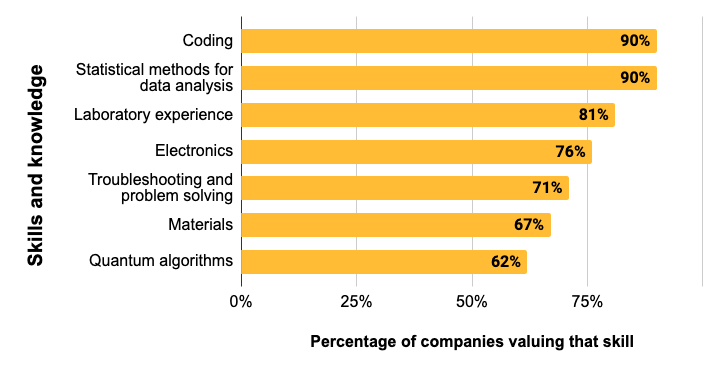 |
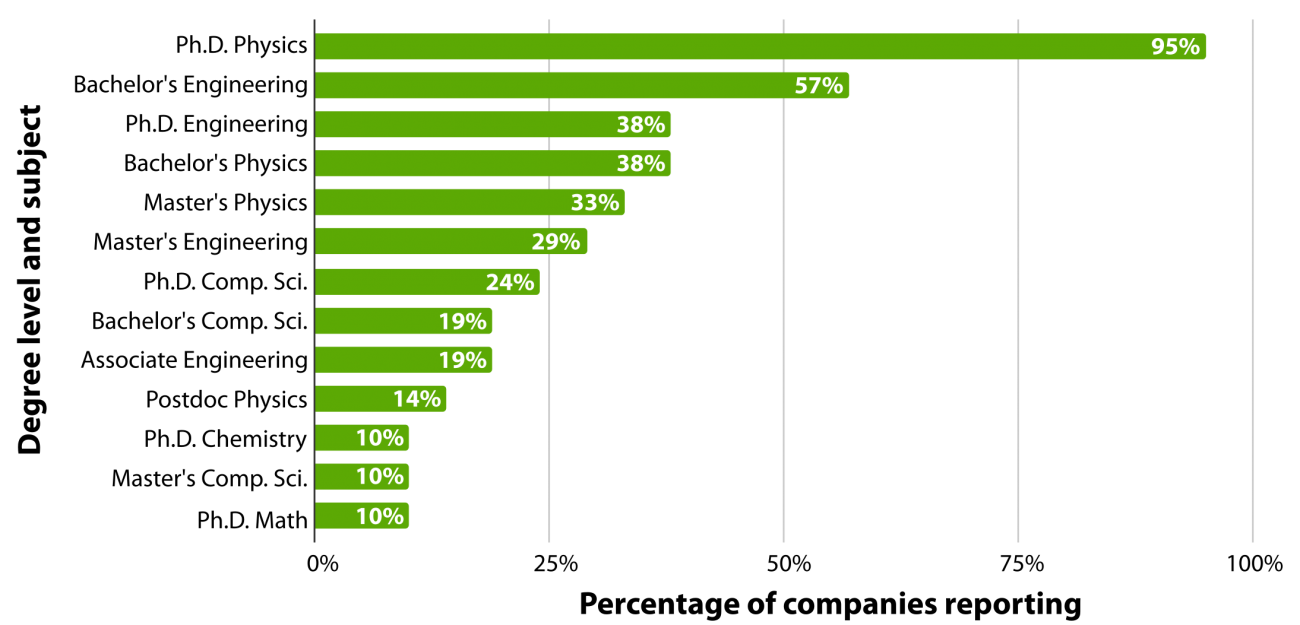 |
| Figure 1: Valued skills shared across companies in the Quantum Industry. |
Figure 2: Preponderance of companies reporting at least 1 employee with given pairs of degree level and subject. |
Inspiration for Course Content
For faculty designing new, or adapting existing, courses to cover material relevant to the Quantum Industry, we have produced skills tables for potential courses with examples of how those skills are useful and valued by the industry. These are featured in the supplemental materials of our publication (Fox, Zwickl & Lewandowski 2020) or can be found below. Items marked with an asterisk indicate shared skills across multiple courses.
Traditional Quantum Theory
|
Traditional Quantum Theory
|
|
Skills
|
Examples
|
|
*Linear algebra
|
"linear algebra at the level of abstraction required for quantum theory. So abstract vector spaces, abstract operators, complex vector spaces" |
|
*Statistics (related to measurement)
|
"statistical nature of making measurements with photons on atoms" |
|
Unitary time evolution
Schrödinger’s equation
Hamiltonians
|
"the Schrödinger equation drives the time evolution that we see"
"having enough mathematical understanding of Hamiltonians and [time] evolution." |
|
Hilbert space
|
"I think there's certain basic background that almost everyone on the team really should know, which kind of has to do with the basic formalism of quantum mechanics: Hilbert space and unitary time evolution and measurements and entanglement." |
|
Entanglement
|
|
Two-level systems
|
"They better be able to write down a two-level or three-level system and talk about rate equations for optical pumping and depletion [for laser sources]." |
|
Spectroscopy
|
"they should be able to have a useful conversation about atomic spectra or be able to say like, no, of course that wouldn't work because the transition's forbidden because of selection rules." |
|
Atomic energy levels & photon interaction
|
"atomic physics knowledge so they can do level like level calculations, and modeling, and Frank-Condon factors" |
Quantum Information Theory
|
Quantum Information Theory
|
|
Skills
|
Examples
|
|
*Linear algebra
|
"in a research scientist role, I would expect them to be able to do the linear algebra, the matrix manipulation, to show what a quantum circuit does." |
|
*Statistics (related to measurement)
|
"quantum mechanics is actually the generalized instance of classical probability theory... you're sampling from this richer probability system" |
|
*Noise sources
|
"it really is just quantum circuits and gates and noise models" |
|
Quantum circuit design and gate model
|
"full noise modeling, gate modeling, algorithm optimization, because not all Mølmer–Sørensen gates are the same. And so the theorists are developing new ways to actually mitigate the noise that we see."
"not necessarily have on call, like what the matrices are for like a CNOT gate and like the Hadamard stuff, but be able to show like this is what the system is doing and that at the end of the day, all these evolutions break down into just a matrix multiplication, a bunch of Pauli matrices."
|
|
Algorithms
|
"the math person has to be able to understand the data model and how to translate it into some algorithm that we might use... They don't have to memorize all the algorithms in the zoo, but they need to know which algorithms we might want to try"
"I'm more interested in the person who can really figure out a quantum algorithm [than use a quantum programming language] and whether or not we can solve a problem using a quantum computer"
|
|
Qubit - abstract
|
"the Bloch sphere being... the very useful picture of the state space of a qubit and being very familiar with that and using that language, because that kind of language is used all the time across the board" |
|
Complexity theory
|
"quantum computing rests pretty heavily on a lot of computer science, and theoretical computer science, of that, about complexity theory and order runtimes of algorithms and why this might provide a speed up"
"You could do a lot with a quantum computer that isn't that useful or doesn't show any advantage over just like a laptop. The things that we're really interested in are showing that we can scale beyond classical hardware and that people have to have kind of like a notion that say, Shor's algorithm for unstructured search is order root N instead of order N"
|
|
Quantum secure communication
|
"what are the encryption algorithms, what are the signatures, how would you think through implementing some new security protocols?" |
|
Hamiltonians
|
"we have a certain implementation of a superconducting qubit and there's a Hamiltonian associated with that and some kind of energy landscape."
"what a Hamiltonian is, how to get the eigenstates"
|
|
High performance computing
|
"we need to understand sort of the state-of-the-art supercomputing methods that quantum computing is up against and then also for some of the applied work. That is, for example, these quantum inspired methods, those ended up running on high performance computing machinery." |
Real-world Quantum Information Theory
|
Real-world Quantum Information Theory
|
|
Skills
|
Examples
|
|
*Coding
|
"be able to program based on established quantum algorithms, be able to debug the quantum processor, be able to collect and analyze data and discuss the results back with me." |
|
*Statistics and
data analysis
|
"Some of what we do is refining our processes and calibrations of [the computer] and that involves doing a bunch of experiments and understanding if you've nullified your hypothesis or proven your hypothesis."
"we have software engineers that contributed to the statistical analysis [of experiments]"
|
|
*Troubleshooting (debugging)
|
"totally different from debugging classical code 'cause classical codes you can step through and quantum codes you can't do that because you'd have to measure and [when you measure] you just throw your information." |
|
*Noise sources
|
"what a gate model machine is, the principles on how it operates, decoherence and noise mechanisms and common failure mechanisms for both models of quantum computation." |
|
Modeling
|
"understanding how to take noisy data, understanding what the underlying physical model of what is dragging that data, knowing how to fit that data and say something statistically meaningful: whether your model is correct or not; or how to update your model." |
|
(De)coherence
|
"the decoherence mechanisms for the technology upon which the sensor operates"
"it's important to know for a particular application whether you want a system that has a longer coherence time or a system that can easily be coupled to some other system. What are the limits of that kind of coupling?"
|
|
Error correction
|
"for quantum error correction, and device design, and simulation obviously need lots of physics" |
|
Open system dynamics
|
"the Schrödinger equation drives the time evolution that we see or, hopefully even more than unitary dynamics, understanding open system dynamics" |
|
Qubit hardware
|
"when you're talking about quantum computing and applications, you don't need to know a great deal about the base hardware except for how it's going to propagate up in terms of decoherence mechanisms" |
|
Hamiltonians
|
"that sort of connection from some abstract Hamiltonian to actual physical reality is of course tenuous and needs to be carefully understood what the limitations are." |
|
Quantum circuit design (physical)
|
"taking a specification of a quantum system in terms of a Hamiltonian and then turning that into a design that will be fabricated. And there's a lot of microwave engineering there, but also strong connections to quantizing microwave circuits." |
Hardware for Quantum Information
|
Hardware for Quantum Information
|
|
Skills
|
Examples
|
|
*Software
|
"someone showing up and knowing how to do CAD is great because we do have to design these systems"
"They need to be able to model quantum systems in Mathematica or MATLAB or however they want to do it."
"there's not just writing the software itself, but, uh, working in a version control system and working in a shared code base where they can leverage all of the work that other people have done and other people can leverage yours." |
|
*Coding
|
"it's still a field that's still probably more on the research side than kind of on the production side and, as a result, Python is heavily used. So somebody with coding skills to be able to take something that's being done and look at: 'Hey, how can I automate, how can I do certain things better, faster, easier?' I think having basic programming skills is probably a necessity in most roles."
"it's not just like I took a course in Python, it's that I've written code with other people, I know how to collaboratively write code with code review, I know how to write unit tests, I know data structures and how useful API might look like." |
|
*Laboratory skills and experience
|
"It's nice to have people who have been in a machine shop. They know to use a center drill before they drill a hole. Even if they never do that here, it's, those people tend to be able to contribute more, and more quickly, because they know what's hard and they know what's not hard."
"we've certainly hired people who have... done either summer internships or worked as their undergraduate capstone in some sort of quantum lab."
"folks who can design an experimental program go and implement it, take the data, understand what the data says, and then decide what the next steps are after that." |
|
*Troubleshooting
|
"a lot of the day to day work is actually fighting software and fighting bugs and figuring out what's going on with the fridge" |
|
*Materials
|
"people that are doing material and process research to try to figure out how to bring in new materials into those devices... what are good thermal insulators, what are good thermal conductors, what are good in electrical conductors, what are the relationships between those, what are the heat capacities of various things." |
|
Cold atoms
|
"they need to know about lasers, wavelengths... optical components... control... scattered lights… measurement techniques." |
|
Ion trapping
|
"the interplay between the electronics and the ions... the physics of just the ion trapping itself, you know, Mathieu equations, stability regions" |
|
Laser cooling
|
"using the light to cool down the atoms, you are removing systematics or trap them in place... and then there's all the hardware around the thing. So, aligning optics, aligning light into fiber optics, using the different detectors, electro-optics, acousto-optics" |
|
Magneto-optical trapping
|
"Quite frankly, if you've got somebody who spent time actually building a MOT and trapping atoms, that experience in itself is more valuable in my opinion, than somebody who can actually do the full derivations." |
|
Bose-Einstein condensates
|
"if they're doing some BEC loading into a trap that detects this and that through some phase shift or whatever they're doing, they need to understand that theory. And I will expect that they can go up to a whiteboard and explain that" |
|
Superconducting circuits
|
"if they're focussing on coherence times or something, then they'll have to pick up a lot of material science and quantum circuit design and understand all the nitty gritty details of how a superconducting qubit is fabricated and where the fields are and what matters for coherence and couplings" |
|
Photonic integrated circuits
|
"in the case of photonic integrated circuits, I need to know that: they know how to construct ring resonators; they know how to work with say AIM photonics, like a foundry." |
|
High performance computing
|
"expertise in kind of traditional high-performance computing, both because, well nowadays, a lot of engineering is done in computer simulation and we need to have simulations of our equipment to design it." |
|
Annealing
|
"I’d expect them to know what an annealer is and the principles upon how and which it operates." |
Electronics
|
Electronics
|
|
Skills
|
Examples
|
|
*Software
|
"being able to do PCB design, like with real software, not, circuit board, not breadboard level things where you're soldering components, but if you designed a board and you send it out and they send you back the board and it works"
"is very proficient in SolidWorks and can design and fabricate a circuit board." |
|
*Laboratory skills and experience
|
"It's fine to know the theories of an opamp but until you've actually built a whole bunch of opamp circuits it's pretty difficult to be useful." |
|
*Troubleshooting
|
"know how to troubleshoot a finicky piece of electronics" |
|
*Noise sources
|
"I don't expect a PhD physicist to be a good person to do a design for an ultra-low noise current source. I'd prefer that that work to be done by an electrical engineer who's got a stronger background, because it ends up being cheaper and faster to do it that way." |
|
*Materials
|
"People who are designing packaging, people who are designing like any wiring to interface with the chips… so people have to have a pretty good understanding of cryogenics as it relates to the design rules around which materials you can use" |
|
Analog systems
|
"in quantum you're usually working at the shot noise limit, single particle limit, single photon limit... you've either lost it or not before it goes into this digital"
"[Analog] matters for superconducting qubits, it matters for ion-trap quantum computing, it matters for clocks"
"where your signal to noise is, it's not great, you need that at analog design."
"signal integrity, having a good idea of how we do the signal analysis, understanding analog theory, whether it's: how are you generating various frequencies? What kind of losses do you see?" |
|
RF and microwave
|
"skilled designers of low noise analog RF... RF engineers: ‘cause we also talk to the atoms, or we talk to some of the components with low noise RF"
"have some concept for what an electromagnetic oscillator is, what the concept of impedance is, how a transmission line works." |
|
FPGA experience
|
"tremendous expertise in embedded coding, in FPGA programming in low power AC development. And so we want to get their help to really transition this into a fieldable, robust product"
"to assemble these FPGA circuitry, circuits that we use to control lasers"
"we have custom FPGA software, so needing to know how the whole system works because you get phase bugs, you get noise blips from your DAC, you get stray fields, the environmental field noise from the lab." |
|
Control systems
|
"feedback circuitry, feedback servo control… at what level can they build a servo circuit?"
"some really good digital driven control loops."
|
|
Superconducting circuits
|
"you need people who can design all of this kind of elaborate circuitry that actually goes down at 20 milli-Kelvin at the bottom of the fridge." |
|
Microfabrication
|
"they maybe could [have expertise] in fabrication techniques and etching and lithography, the standard stuff or packaging" |
|
Signal processing
|
"what the time delay per unit length, the speed of light in a coaxial cable is" |
Mechanical Engineering
|
Mechanical engineering
|
|
Skills
|
Examples
|
|
*Software
|
"we use SolidWorks heavily here for thermal system and mechanical design… At the end of the day, they're kind of all the same… if they used Inventor or ProE or whatever in their past life." |
|
*Laboratory skills and experience
|
"they go out into the manufacturing facility and they can put their hands on any part of the manufacturing process and qualification process so that they can really see the product all the way through." |
|
*Troubleshooting
|
"troubleshooting manufacturing processes... we sometimes have customers who want us to use specific metals or are going to be using a system in an application where non-magnetic properties are important." |
|
*Noise sources
|
"So some understanding of vibrational analysis, how to isolate vibration, how to damp vibration, stiffness of materials." |
|
*Materials
|
"different materials, I think different metals, different ceramics can be important. I mentioned flexures, any kind of coupling, sort of the difference between stiffness and compliance and whether that can transmit vibration into a test chamber." |
|
Thermal physics
|
"So trying to understand the feasibility of something... in a thermal sense and in a conservation [of] energy sense in these sort of back of the envelope calculations that you'd be doing a lot in undergraduate physics."
"do like FEA [finite element analysis] simulations of heat transfer, of mechanical stresses" |
|
Specifications
|
"we work with [clients] very closely on specifications indeed. And we may even understand the applications. However, in terms of everything we deliver, the specifications are absolutely in very classical terms."
"They don't need to know the quantum, but they need to know for example, the specifications [that] are suitable for quantum." |
|
Instrumentation
|
"maybe you haven't worked with everything that we have in our lab, but you know how to read a manual or you know [how to] come up to speed on a piece of equipment that you haven't worked with before." |
|
Mechanical design
|
"machining is really useful because if you're doing the mechanical design, if you know how the different machines operate... it affects the way you design things, you design things so that they're more easy to manufacture because here's the tools that are going to be used for this." |
|
Mechatronics
|
"what happens if you... want to query it spatially? Now you got to move it, or you have to move the, the optical system... You need to understand how to drive electromechanical devices, piezo-materials, need to have an understanding of flexors" |
|
Microfabrication
|
"people who have at least seen some, some MEMs, lithography, microfabrication techniques so they... know what those tool kits look like." |
|
Superconducting hardware
|
"We've needed lots of fabrication engineers and material specialists [who have] actually built the superconducting circuits" |
|
Cryogenics
|
"because you just don't get down that cold unless you can really have a deep understanding of what's heating up your device under test. All the mechanisms of heat transfer are equally important. And then managing the liquid helium and even sometimes two-phase flow or three-phase flow." |
|
Vacuum
|
"you build these vacuum systems, things like the glue matter, because the glue out gases and stuff like this and spoils your system" |
Optics and opto-mechanics
|
Optics and opto-mechanics
|
|
Skills
|
Examples
|
|
*Software
|
"the people who would do optical engineering, knowing Zemax or an equivalent design program is nice" |
|
*Troubleshooting
|
"we expect a certain understanding of precision measurement, of spectroscopy, of Fabry-Perot cavities, of signals, and methods for debugging bad locking signals." |
|
*Noise sources
|
"in terms of optics: it's characterizing laser line width, laser noise, stabilizing lasers to a fixed frequency, either by locking to atoms or locking to cavities." |
|
*Materials
|
"they should understand that the coefficient of thermal expansion of quartz is darn near aluminium." |
|
Waves
|
"quantum systems really care about precision wave-form shaping" |
|
Atomic energy levels & photon interaction
|
"be able to calculate transition matrix elements and know where that comes from. So be able to deal well with light-matter interactions… It's non-linear optics." |
|
Quantum optics/non-linear optics
|
"the most useful knowledge is… having worked in a laser lab… doing some sort of frequency conversion" |
|
Photonic integrated circuits
|
"photonic integrated circuits for managing our laser light."
"So people that are able to design and simulate and actually run experiments with photonic integrated circuits are quite valuable."
|
|
Spectroscopy
|
"my beam diameters are smaller and so they're going to be less uniform across the atom cloud and so that's going to give me a distribution of Stark shifts." |
|
Vacuum
|
"everything we do ends up being shining lasers at atoms in a vacuum chamber." |
|
Mechanical design
|
"I think things like building fiber optics systems and being able to splice them all together and this type of stuff are useful skills."
"If I see somebody designing a mount with some massive cantilever off to the side that's holding some precision optics in it, then that's a bad sign." |
|
Lasers
|
"if those engineers came and they knew how to lock a laser to a cavity or an atomic ensemble, that would be great. If they've worked in different wavelengths, but that is kind of a unique thing that comes out of working on these quantum systems" |
In the Press
- Hands-on Lab Skills Key for Quantum Jobs, October 2020 - Physics 13, 163.
- Now Hiring: The New Quantum Workforce, October 2020.
- New study outlines steps higher education should take to prepare a new quantum workforce, November 2020.
- Higher Education Readies for a Quantum Leap, March 2021 - Communications of the ACM.
Acknowledgments
This work was done as part of the CUbit Quantum Initiative, which includes Q-SEnSE: Quantum Systems through Entangled Science and Engineering (NSF 1096 QLCI Award OMA-2016244). Support was provided by the University of Colorado Boulder, Rochester Institute of Technology, NSF PHY-1734006, and NSF MPS-1937076.
